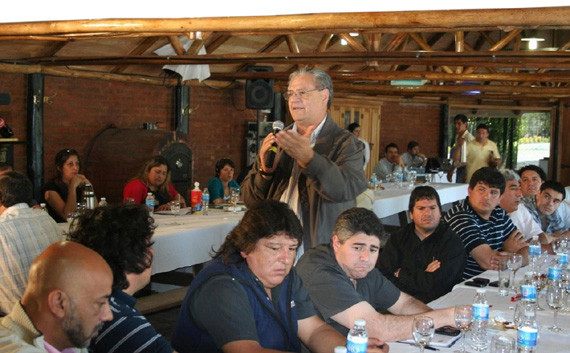|
During the Second
Conference of Mercosur Meat Industry Workers, SIREL spoke with Alberto Fantini,
general secretary of Argentina's Trade Union Federation of Meat Industry Workers,
who outlined the leading challenges faced by the industry's workers in his
country.
-Could you give
us an overview of the crisis impacting the sector in Argentina?
-We're going
through one of the worst moments in the history of the meatpacking industry, and
there are several causes that led up to this crisis:
a misguided government policy,
climate problems, and the slaughtering of breeding cows that has resulted in a
shortage of 3 million heads of cattle.
Right now, 30
percent of the industry is idle, we have 70 meatpacking plants that have applied
for subsidies because they're only working three or four hours a day, and 14 of
the plants where we represent workers have shut down, leaving 3,000 workers out
of work. Things are getting harder and harder every day.
In addition,
while consumption of white meat has gone up, from 20 to 35 kilos per capita a
year, red meat has dropped from 70 to 50 kilos.
But we see this
as an opportunity to begin recovering. A forum like this Coordinating Body of
Mercosur Meat Industry Workers can give us a platform from which we can
finally make ourselves heard, because often the actions we take end up go no
farther than one State Ministry, having no effect beyond that.
-Has the
industry reached its lowest point?
-I think we're
in for even more difficult times, because we don't understand exactly what
JBS - Friboi,
for example, wants to do in Argentina, and we're convinced that
monopolies are not the answer to anything.
Friboi has already shut down two
or three plants of the eight it has in the country, and we've received
information that it might close another one within the next few days.
|
We're paying the costs of their
business success. |
-There's an
element of national sovereignty in all of this, isn't there?
-As workers, we
need to realize that it doesn't matter where management is from if it complies
with labor laws. But we still need to think this over a little more, because
it's giving us a lot of problems and we don't know how things are going to
evolve.
Also,
apparently not all transnational corporations behave the same way.
Marfrig,
for its part, is operating practically unaltered, while
Cargill
has also started buying plants and we need to see where it's going. But of the
current three Brazilian groups, I'm not sure how many will remain in the end.
They did good business when they had the chance, and now they're leaving their
workers out of a job. So we're paying the costs of their business success.
-What role can
a coordinating body of Mercosur meat industry workers play?
-The
coordinating body and the IUF have a crucial role to play, because we
think we're still in time to make ourselves heard.
The
coordinating body can give us a platform to voice our concerns and be heard. The
cattle sector needs to be encouraged to breed more animals, and the country
needs to start changing its way of thinking.
This is a clear indication that something is not working, or that things are
changing. Short-term policies are implemented, to address the day-to-day, but we
need to have a long-term plan, and this coordinating body can give us the
strength and visibility necessary to make it happen.
 |